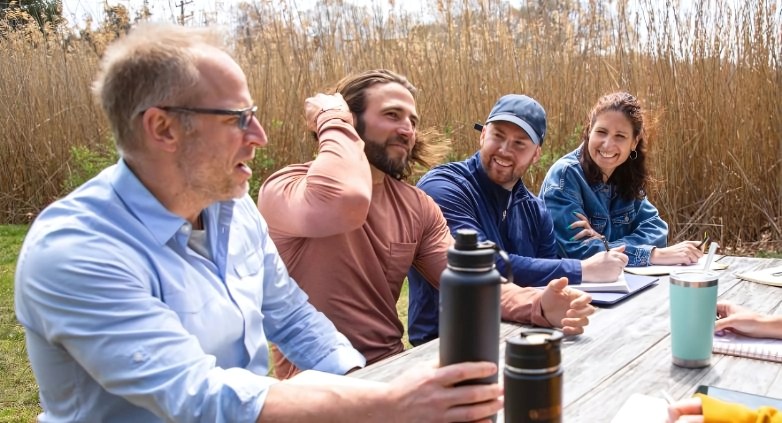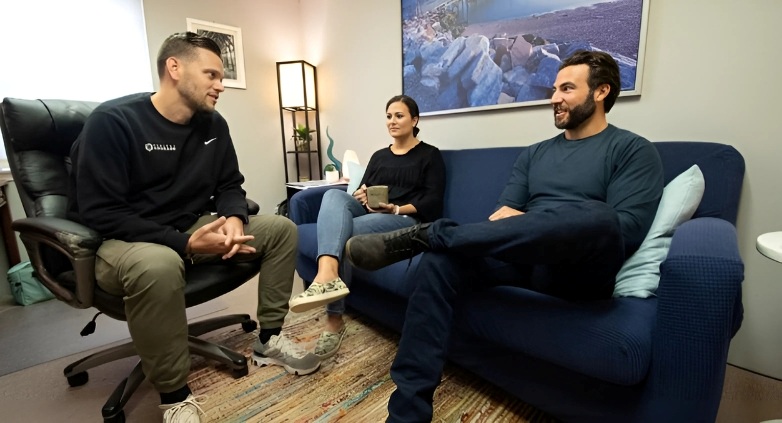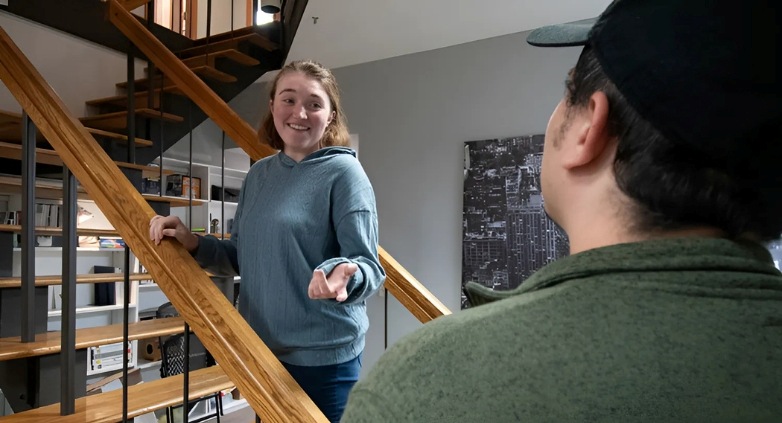
How to Help a Drug Addict Family Member
Watching someone you love spiral into addiction is heartbreaking. It’s natural to feel helpless and unsure of the best way to support them. However, there are compassionate, evidence-based strategies that can guide you through this challenging journey.
If you’re wondering how to help a drug addict family member, this article provides practical steps to recognize the signs, encourage treatment, set boundaries, and ensure your own well-being along the way.
Recovery is possible, and your involvement plays a crucial role in making it happen.
Real people. Real support.
Seeking Help for Yourself or a Loved One?
Connect with our professionals to start the journey to recovery.
Call 860.388.9656 for immediate support.

Recognizing the Signs of Addiction
Identifying addiction early is one of the most critical steps in supporting your loved one. Addiction affects individuals differently, but there are common behavioral, physical, and emotional indicators to watch for.
Behavioral Indicators
- Withdrawing from family or friends.
- Neglecting responsibilities like work or school.
- Secretive behavior or associating with new social groups.
- Sudden financial problems or borrowing money without explanation.
Physical Indicators
- Noticeable weight loss or gain.
- Poor hygiene or unusual odors.
- Bloodshot eyes or dilated pupils.
- Slurred speech or unsteady movements.
Emotional Indicators
- Extreme mood swings.
- Irritability, paranoia, or depression.
- Anxiety or unexplained outbursts of anger.
Tip for Families: Document these signs objectively. When discussing concerns, focus on specific observations rather than accusations.
For more details on this topic, visit our guide on the effects of drug addiction on family members.

Understanding Addiction as a Disease
When considering how to help a drug addict family member, it’s important to understand that addiction is not a choice or a moral failing.
Instead, it is a chronic disease that alters the brain’s reward system, making it incredibly difficult for individuals to stop using substances even when they want to. Recognizing this can help families approach their loved one with empathy and patience.
Breaking the Stigma
Society often views addiction through a lens of shame, but this stigma only hinders recovery. Recognizing addiction as a disease fosters empathy and reduces judgment, which are essential for family support.
Impact on Families
Addiction doesn’t just affect the person struggling—it impacts the entire family. Relationships are strained, trust is broken, and roles within the family dynamic often shift.
Supporting with Empathy
Approach your loved one with compassion while holding them accountable. For example, instead of saying, “Why can’t you stop?” try, “I see you’re struggling, and I want to help.”
Learn more about the family role in addiction recovery.
Free Download
Proven Programs for Lasting Recovery
Receive your free guide to understanding alcohol addiction and discovering recovery programs tailored to you. Learn how to build a personal sobriety plan and get support every step of the way.
Educate Yourself About Addiction
To truly understand how to help a drug addict family member, education is key.
Why Education Matters
The more you learn about addiction, the better equipped you’ll be to support your loved one without enabling destructive behaviors.
Recommended Resources
- National Institute on Drug Abuse (NIDA): Offers research-backed information on addiction and recovery.
- Substance Abuse and Mental Health Services Administration (SAMHSA): Provides helpful tools, helplines, and webinars for families.
Books like Beyond Addiction and The Anatomy of Addiction are excellent starting points for understanding the psychological aspects of addiction.

Setting Boundaries with Compassion
Boundaries are not about punishment—they’re about protecting yourself and encouraging recovery.
What Are Healthy Boundaries?
Setting boundaries means refusing to enable harmful behaviors while remaining supportive. Examples include:
- Not giving money to support substance use.
- Refusing to lie or cover for their mistakes.
- Not allowing substance use in your home.
Why It’s Difficult
Many families struggle with guilt or fear that setting boundaries will push their loved one away. Remember, healthy boundaries are acts of love.
Actionable Tip: Create a list of non-negotiables and practice clear, consistent communication.
For more guidance, read our article on why family support groups are a crucial part of the treatment process.

Encouraging Professional Help
Convincing a loved one to seek treatment is often one of the most challenging steps.
When and How to Start the Conversation
Choose a calm moment when your loved one is sober. Use non-confrontational language such as: “I’ve noticed some changes in you, and I’m worried. Let’s talk about how I can help.”
Available Treatment Options
- Intensive Outpatient Programs (IOP): Offers a balance of treatment and daily responsibilities. Learn more about IOP at Project Courage.
- In-Home Recovery Services: Provides privacy, convenience, and personalized care for those hesitant about attending a facility. Explore our in-home services.
- Virtual Services: A flexible and private option that can serve as a gateway to more intensive care.
If these conversations feel overwhelming, consider involving a professional interventionist or addiction counselor.

The Role of Family in Recovery
When learning how to help a drug addict family member, it’s crucial to understand that recovery is a team effort.
Families play an integral role in the process, providing the support, stability, and encouragement that can make all the difference in a loved one’s journey to sobriety.
Family Therapy Benefits
Family therapy helps address codependency, rebuild trust, and improve communication. It ensures that everyone is working towards the same recovery goals.
Creating a Supportive Environment
Remove potential triggers, celebrate small victories, and remain patient during setbacks. Recovery is rarely a straight path, but your support matters.
For a deeper dive, read our article on family therapy for addiction.
Real people. Real support.
Seeking Help for Yourself or a Loved One?
Connect with our professionals to start the journey to recovery.
Call 860.388.9656 for immediate support.
Navigating Resistance to Treatment
Resistance is common, but persistence and understanding can make a difference.
Why Resistance Happens
Fear of withdrawal, shame, and stigma often prevent individuals from seeking help.
Strategies to Overcome Resistance
- Use “I” statements like, “I’m concerned because I see you struggling.”
- Share real-life success stories from others in recovery.
- Be patient and consistent. Change takes time.
Knowing When to Back Off: Sometimes, the best course of action is to give them space while remaining supportive and ready to help when they’re ready.

Utilizing Virtual and In-Home Recovery Options
When exploring how to help a drug addict family member, modern recovery programs offer more accessible and flexible solutions than ever before.
Options like virtual therapy and in-home recovery services provide personalized care in a private and convenient setting, making it easier for your loved one to take the first steps toward recovery.
Virtual Services
Virtual therapy allows individuals to access help from the comfort of their homes, eliminating barriers like transportation or stigma.
In-Home Recovery Services
For families in Connecticut and Massachusetts, Project Courage offers in-home recovery services tailored to individual needs. This option provides convenience, privacy, and a personalized approach to care.
Learn more about in-home recovery services.
Taking Care of Yourself
Supporting a loved one through addiction is emotionally and physically draining. Prioritize your own well-being to ensure you can be there for them.
Practical Self-Care Tips
- Join support groups like Al-Anon or Nar-Anon.
- Take breaks to engage in activities you enjoy.
- Build a personal support network of friends or a therapist.
Reassurance: Taking care of yourself is not selfish—it’s essential for sustaining long-term support.
For additional tips, check out families in recovery.
FAQs
If you’re wondering how to help a drug addict family member who refuses treatment, the key is to stay supportive while avoiding enabling behaviors. Educate yourself about addiction to better understand their struggles, and consider consulting a professional for guidance on next steps, such as staging an intervention or exploring alternative approaches to encourage treatment.
Balancing tough love and compassion starts with setting clear, firm boundaries while maintaining an empathetic and supportive approach. Communicate your expectations calmly and consistently, but avoid shaming or blaming your loved one. For example, you can say, “I love you and want to support your recovery, but I cannot support behaviors that enable your addiction.” This approach allows you to protect your emotional well-being while still encouraging their journey toward recovery.
Absolutely, family therapy is highly effective in addiction recovery. It addresses underlying issues like codependency and unhealthy dynamics, improves communication between family members, and helps rebuild trust that may have been broken during addiction. Family therapy also equips loved ones with tools to provide meaningful support while fostering a healthier, more connected family environment. By participating in therapy, families become a vital part of the recovery process.
In most cases, no. Treatment is more effective when a person voluntarily commits to it. However, if their substance use poses a risk to themselves or others, you can explore legal interventions like court-mandated treatment. It’s important to consult with a professional to understand your options.
Enabling behaviors might include making excuses for their actions, giving them money to support their habit, or ignoring their substance use to avoid confrontation. To break this cycle, set clear boundaries and focus on supporting their recovery, not their addiction.
Relapse is often part of the recovery process. Instead of seeing it as a failure, use it as an opportunity to revisit treatment goals and adjust the recovery plan. Your continued support is crucial during this time.
Do You Have More Questions?
Contact Project Courage for personalized guidance or visit our FAQ page for additional resources.
Free Download
Proven Programs for Lasting Recovery
Receive your free guide to understanding alcohol addiction and discovering recovery programs tailored to you. Learn how to build a personal sobriety plan and get support every step of the way.
The Importance of Taking Action
Understanding how to help a drug addict family member begins with recognizing the power of family involvement in the recovery process.
Addiction is a tough battle, but family involvement can make a world of difference. By educating yourself, setting boundaries, and encouraging professional treatment, you’re creating a path for your loved one to heal.
If you’re ready to take the next step, Project Courage offers a variety of services, including In-Home Recovery Services, Intensive Outpatient Programs, and Family Support Services to help families like yours.
Let us guide you:
- Learn about our approach to recovery.
- Explore family services for addiction.
- Find out more about in-home recovery options.
Recovery starts with one small step.
Reach out to Project Courage today to begin the healing process for you and your loved one.


